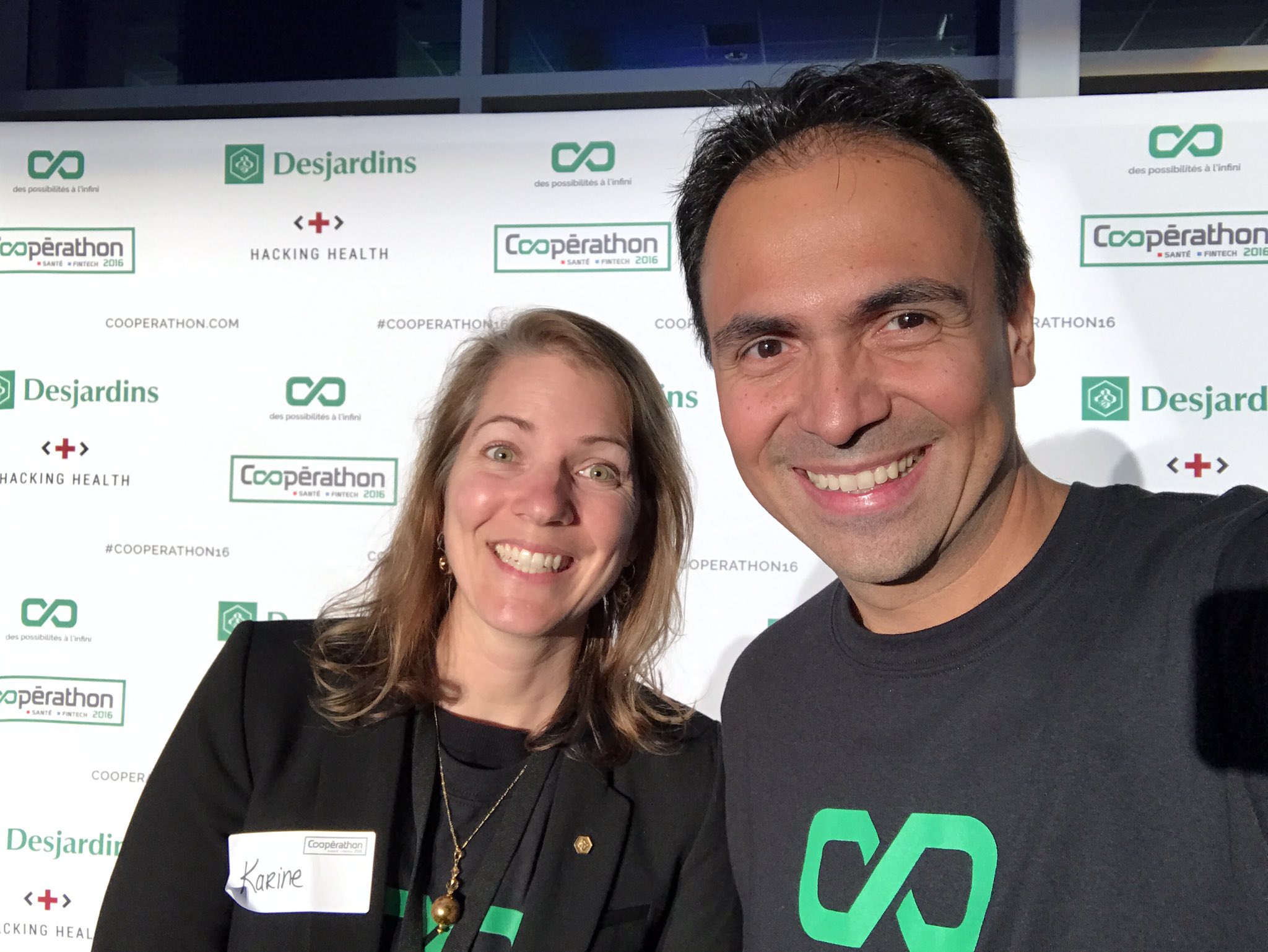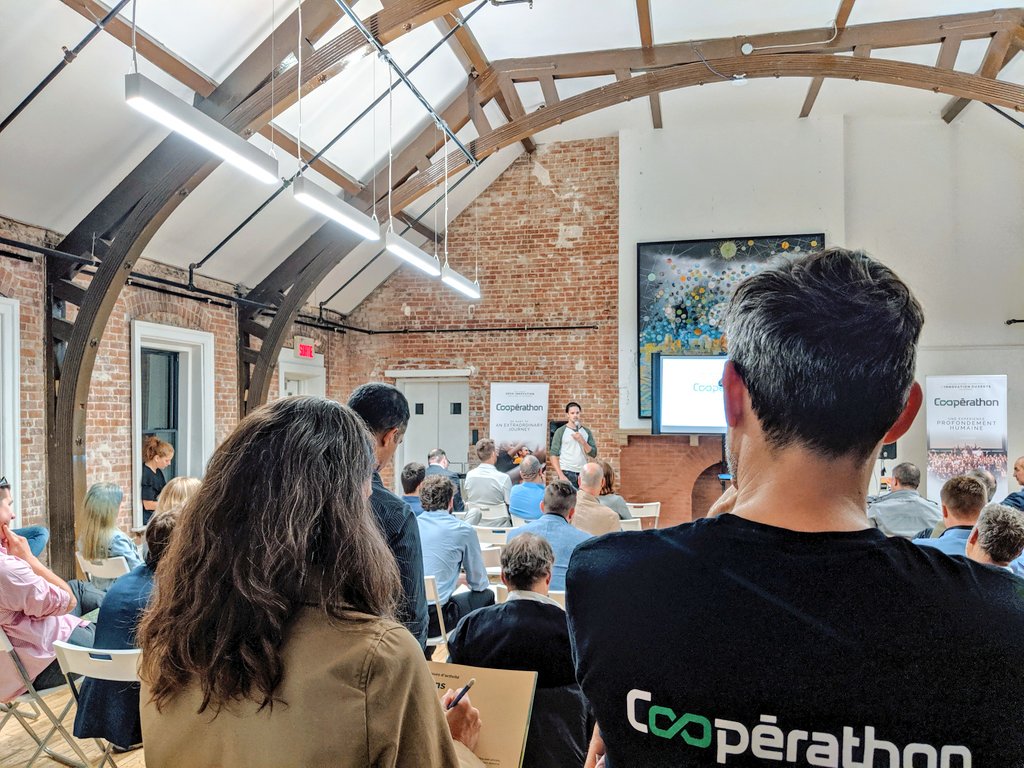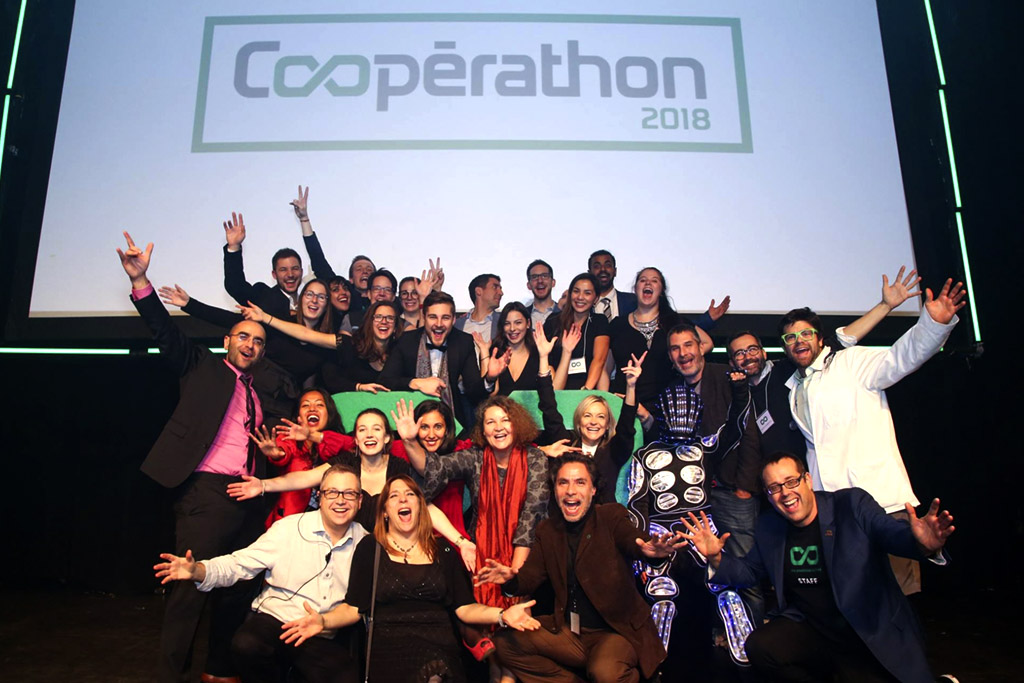Cooperathon, the leading international social innovation competition, will be held for the first time in November, in Latin America.
By César Salvatierra / Translation by Pedro Luiz Freire Cardadeiro
Spanish version
“When it comes to social issues, people are fed up of ideas that come from management,” said Federico Puebla, who chairs the Cooperathon. For the Director of Open Innovation at Desjardin, this is a fundamental observation in the implementation of the event in 2016. An international meeting where technology, innovation and artificial intelligence (AI) leave laboratories to solve social problems, issues that governments do not stick their noses in, and where citizens themselves are the managers of change. Moreover, the social impact is the objective of this marathon of ideas that began in Quebec, before heading to Belgium and then in France. This event is being held in Chili due to a partnership with the Coopeuch economic cooperative.
“We want it to be possible for citizens to act on situations that concern them, rather than waiting for governments to intervene. It is up to them to have the power to conduct research, create and carry out projects in the service of communities,” said Mr. Puebla, also in charge of the Dejardins’ Startup in Residence Program. Furthermore, he described the Cooperathon as a model for the “pre-incubation” of technology-based projects. “Since our values are universal, we chose to go beyond borders of Quebec,” he said, when we met at Café Osmo; close to Maison Notman, which houses Dejardins Labs, as well as various innovation companies such as Real Ventures, Montreal New Tech and Bonjour Startup Montréal. In 2018, the Cooperathon which took place in France, was held simultaneously in five regions, including Tahiti and Guadeloupe. “It was an incredible success from coast to coast!,” explained Federico Puebla.
Oxygen for ideas
Following its conception and implementation by Desjardins Group (the largest cooperative financial group in Canada), the Cooperathon brought together companies as well as creators of social change from different backgrounds.
“Technology makes it possible to democratize entrepreneurship, since it is within everyone’s reach,” said Federico Puebla. The event grew by 64% annually, with a constant diversification of participants.
The first prize winner in 2018 was the Watergeeks project, which was a revealing choice of the Cooperathon’s preferred profiles. A platform that allowd specialized companies to make their surplus equipment available to different groups or communities through a purchase, sale and loan system. Initially used in water treatment in Quebec, its application has spread to other industrial sectors and other regions of the world.
In many ways, the idea of the Cooperathon is similar to that of the hackathon; these collaborative work sessions recognized for their results in the computer and technology sectors. “In a hackathon, problem solving is most often the responsibility of technology specialists, such as programmers,” noted Federico Puebla. As we are working on social issues, we wanted to establish an experience involving the people concerned and create a socially responsible model.
Thus, the Cooperathon was born, with cooperation as the oxygen of ideas. Each project comes from the collaboration of people from different fields.
Moreover, this is a field work that led to the definition of the issues explored by the Cooperathon. For example, Federico Puebla talkd about a group of farmers who are trying to integrate artificial intelligence into this sector and whom he heard last year with his team. Today, the Cooperathon focuses on six main themes: health, education, ecology, energy, agriculture and inclusive finance. “Health and education are the most popular and interesting issues. For citizens, education of their families and children is an unavoidable concern. In regard to AI, the popularization of the concept is continuing among the population and the Cooperathon has developed various products dedicated to it: last year, the interest it generated was close to that of health at the event and it is expected to be the focus of attention in 2019. Despite the high level of education in Canada, one in three people are in debt and this indicates a need for financial education. Therefore, thanks to AI, this year we are developing projects that aim to innovate in this direction,” said Federico Puebla.

Impact angles
Last July, at the Startupfest Montréal 2019, a member of the Desjardins Labs team, Patricio Gutiérrez – a Spanish-Canadian from Chili – spoke to Hispanophone about the idea of investing in Latin America. A series of exchanges had been undertaken with partners, involving institutions from Argentina, Brazil and Peru, among others. Subsequently, the fourth edition of the Cooperathon will be held in Valparaíso, Chile, in cooperation with the financial institution Coopeuch. An opportunity that presents itself as a decisive factor in creating new relationships, with the aim of developing the significance and social impact of its projects. The media announcement was made in August. This first Latin American edition, which begins on November 25th, addresses three main themes that are in line with the United Nations’ sustainable development objectives: health, ecology and inclusive finance. For 25 days, the registered teams will participate in specialized workshops and several work exchanges. An event that will conclude with the “grand finale” of the Cooperathon, where projects that are particularly worthy of social impact in Chile will be implemented.
“We aspire to projects that can be translated at the local or community level and even, why not, at the regional or national level,” said Oscar Roa, Regional Director of Coopeuch, who is promoting the project with various institutions.
This first edition of the Latin American Cooperathon can be an opportunity to build bridges by addressing deep social issues, such as poverty. Canada has one of the lowest poverty rates in the world. However, what distinguishes a poor person in Canada from a poor person in another country?
“If we can see social issues from the perspective of other societies, it becomes possible to develop perspectives that fit our ways of doing things. The potential for social impact is unlimited,” said Federico Puebla, who came to Canada a long time ago from his native Argentina. The Spanish-Canadian sees the value of this Cooperathon as it prepares to take place in Latin America. A few steps from the coffee shop where we met, other leaders in innovation were also preparing their ideas. There are so many inspiring people around us and who knows, that late afternoon may have given them a new idea, the right idea.

César Salvatierra holds a bachelor’s degree in Hispanic Studies from Université de Montréal. A specialist in the promotion of Hispano-American culture in Quebec, he is an editor and public relations officer for Hispanophone. More articles by the author
Pedro Luiz Freire Cardadeiro is currently completing a master’s degree in Translation Studies at Concordia University. He is an administrative assistant for Brazil at the International Civil Aviation Organization (ICAO) as well as an independent translator. He has a passion for languages and Latin American cultures and he translates from English to French, Spanish to French and vice versa.

